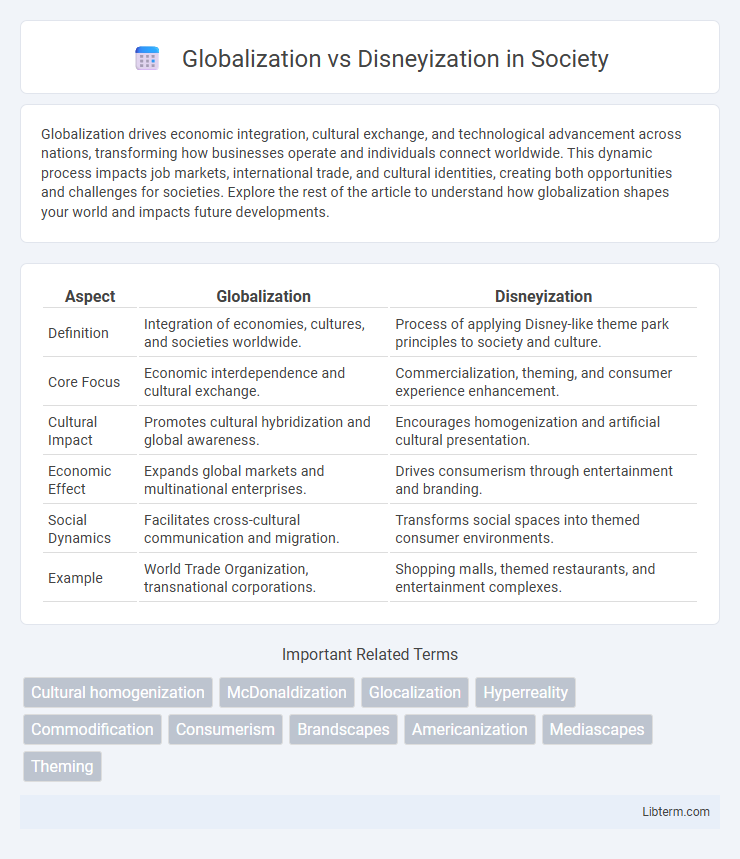Globalization drives economic integration, cultural exchange, and technological advancement across nations, transforming how businesses operate and individuals connect worldwide. This dynamic process impacts job markets, international trade, and cultural identities, creating both opportunities and challenges for societies. Explore the rest of the article to understand how globalization shapes your world and impacts future developments.
Table of Comparison
| Aspect | Globalization | Disneyization |
|---|---|---|
| Definition | Integration of economies, cultures, and societies worldwide. | Process of applying Disney-like theme park principles to society and culture. |
| Core Focus | Economic interdependence and cultural exchange. | Commercialization, theming, and consumer experience enhancement. |
| Cultural Impact | Promotes cultural hybridization and global awareness. | Encourages homogenization and artificial cultural presentation. |
| Economic Effect | Expands global markets and multinational enterprises. | Drives consumerism through entertainment and branding. |
| Social Dynamics | Facilitates cross-cultural communication and migration. | Transforms social spaces into themed consumer environments. |
| Example | World Trade Organization, transnational corporations. | Shopping malls, themed restaurants, and entertainment complexes. |
Understanding Globalization: A Broad Overview
Globalization refers to the increasing interconnectedness of economies, cultures, and populations driven by trade, communication technologies, and migration. It promotes the exchange of goods, ideas, and cultural practices across national borders, creating a complex web of interdependence. Disneyization, in contrast, implies the process by which diverse cultural experiences are homogenized and commercialized, often reflecting a commodified global culture influenced heavily by corporate entertainment models.
Defining Disneyization: Concept and Origins
Disneyization refers to the process by which principles of The Walt Disney Company's theme parks influence diverse sectors of society, transforming experiences into entertainment-centric, thematically controlled environments. Coined by sociologist Alan Bryman, the concept highlights four key dimensions: theming, dedifferentiation of consumption, merchandising, and performative labor. Originating in the early 2000s, Disneyization critiques the homogenization and commercialization trends driven by entertainment-driven capitalist practices globally.
Key Differences Between Globalization and Disneyization
Globalization refers to the increasing interconnectedness of economies, cultures, and populations driven by trade, technology, and communication, while Disneyization describes the process by which principles of the Disney theme parks--such as theming, hybrid consumption, merchandising, and emotional labor--spread across various sectors. Key differences include globalization's broad impact on international trade, cultural exchange, and political relations versus Disneyization's focus on consumer experience, commercial entertainment, and cultural homogenization within service industries. Globalization promotes diversity through cross-border integration, whereas Disneyization often leads to standardization and commodification of culture and social interactions.
The Spread of Culture: Globalization vs Disneyization
The spread of culture through globalization involves the integration and exchange of diverse cultural elements across borders, fostering cross-cultural understanding and hybrid identities. Disneyization, in contrast, represents a homogenization of culture characterized by thematic consumption, commodification, and standardization rooted in the Disney model, leading to a more uniform global cultural landscape. While globalization promotes cultural diversity and interaction, Disneyization often results in the replication of familiar, entertainment-driven cultural experiences worldwide.
Economic Impacts: Globalization’s Reach vs Disneyization’s Scale
Globalization drives economic integration by expanding international trade, investment, and labor mobility, fostering diverse market opportunities and competitive advantages across borders. Disneyization emphasizes replicable, experiential consumption models that standardize products and services, amplifying brand influence and consumer spending within controlled environments. The economic impact of globalization is broad and multifaceted, while Disneyization concentrates on scalable, high-margin sectors like entertainment, retail, and themed hospitality, reshaping local economies into consumption-centric hubs.
The Role of Media in Globalization and Disneyization
Media plays a pivotal role in globalization by disseminating cultural content and ideologies across borders, facilitating a shared global consciousness. In the context of Disneyization, media promotes the commodification of culture through standardized, entertainment-driven narratives that emphasize consumption, spectacle, and theming. This dual influence of media accelerates cultural homogenization while simultaneously shaping consumer behaviors aligned with Disney's model of themed experiences and brand-driven engagement.
Homogenization vs Hybridization of Global Cultures
Globalization promotes the homogenization of global cultures by spreading standardized products, media, and lifestyles, often exemplified by the Disneyization of entertainment and consumer spaces, which emphasizes uniformity, theming, and brand-driven experiences. In contrast, hybridization reflects the blending and adaptation of diverse cultural elements, resulting in unique, localized cultural expressions that resist complete cultural uniformity. The tension between homogenization and hybridization illustrates how global cultural flows both impose dominant norms and enable creative, context-specific reinterpretations.
Consumerism and the Experience Economy: Disneyization Explained
Disneyization transforms consumerism by blending themed environments, merchandising, and branded experiences to create immersive participation in the experience economy. Unlike traditional globalization, which standardizes products and services worldwide, Disneyization emphasizes emotional engagement and interactive consumption through four dimensions: theming, dedifferentiation of consumption, merchandising, and performative labor. This approach drives consumer demand by offering personalized, memorable experiences that generate brand loyalty and deeper economic value beyond mere product utility.
Sociopolitical Effects: Power Dynamics in a Globalized World
Globalization and Disneyization influence sociopolitical power dynamics by reshaping cultural identities and economic hierarchies worldwide. Globalization accelerates cross-border interactions that can both empower marginalized groups and exacerbate inequalities through uneven resource distribution. Disneyization, characterized by cultural homogenization and commercialization, often reinforces dominant Western ideologies, impacting local governance and social agency in diverse communities.
Future Trends: Converging or Competing Forces?
Future trends in globalization and Disneyization reveal both converging and competing forces shaping consumer culture and economic integration. Globalization drives interconnected markets and cultural exchange, while Disneyization emphasizes themed experiences, consumption, and control within branded environments. Emerging technologies and shifting consumer preferences suggest a hybrid landscape where global cultural flows intertwine with immersive, commodified experiences.
Globalization Infographic

 libterm.com
libterm.com